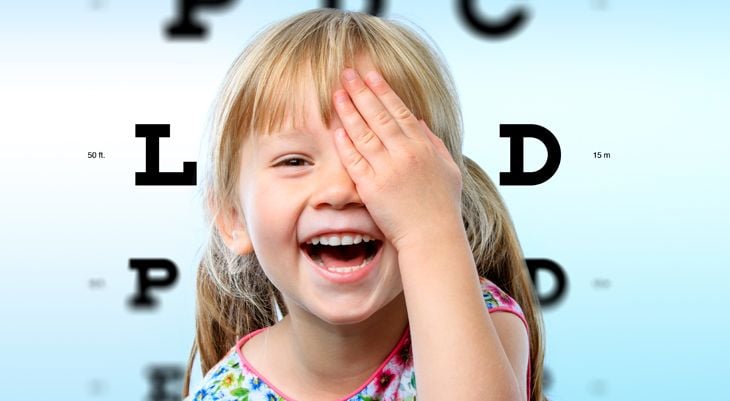Lazy eye, also referred to as amblyopia, is a condition that develops in infancy or early childhood, and it typically starts when the focus in one eye is more enhanced than the other. The eye with less focus might be impaired due to a significant amount of farsightedness or astigmatism, or something
Read morePediatric Vision

Most schools provide vision screening programs to identify children who have problems with eyesight. Although these provide a great opportunity to notice common vision problems, many vision issues go undetected in school exams. A comprehensive eye exam from an optometrist is needed to accurately diagnose a range of common pediatric vision issues.
Treatment of Pediatric Vision Issues
Although glasses may help with these pediatric vision issues, vision therapy is the most common course of treatment. Vision therapy actually retrains the eyes to work together, focus appropriately, and track objects. This may include in-office therapy with special instruments as well as personalized at-home exercises to practice vision skills. Successful vision therapy changes the eyes' functioning to facilitate clear vision.
-
Lazy EyeCategory: Pediatric Vision
-
Pediatric OphthalmologyCategory: Pediatric Vision
Ophthalmology addresses the physiology, anatomy and diseases of the eyes. Pediatric ophthalmology focuses on the eyes of children. Pediatric ophthalmologists examine children’s eyes to see if they need corrective lenses or other treatments to improve their vision. Training for Pediatric Ophthalmologists Pediatric
Read more -
Wandering EyeCategory: Pediatric Vision
A wandering eye is a type of eye condition known as strabismus or tropia, and it may be caused by damage to the retina or muscles that control the eye, stroke or brain injury, or an uncorrected refractive error like farsightedness. With a wandering eye, one eye deviates or wanders in a different direction
Read more -
Reading and WritingCategory: Pediatric Vision
For many adults, reading and writing come so naturally that they seem almost effortless. However, reading and writing are actually complicated skills that take significant effort to learn. For example, reading involves recognizing letters, associating letter combinations with their corresponding sounds,
Read more -
DyslexiaCategory: Pediatric Vision
Dyslexia When a child has difficulty reading due to problems recognizing speech sounds and learning how they connect to words and letters, the condition is known as dyslexia, a learning disorder caused by genetic traits that disturb how the brain works. It affects areas of the brain dealing with language
Read more -
Crossed EyesCategory: Pediatric Vision
Crossed eyes, also known as strabismus, refer to a condition in which both eyes do not look at the same place at the same time. Often times they both turn in, but may also turn out. What Causes Crossed Eyes? The six muscles attached to each eye, which control how it moves, receive signals from the brain.
Read more -
AutismCategory: Pediatric Vision
Symptoms and Problems Caused By Autism Autism is a neurological disorder in which the person has difficulty processing and reacting to information received from their senses. The individual also has trouble communicating and interacting socially. Signs of autism include: Lack of shared social interaction Postponement
Read more -
ADD/ADHDCategory: Pediatric Vision
Approximately 11% of school-aged children have been diagnosed with attention deficit/hyperactivity disorder (ADHD), according to recent studies. The central symptoms of ADHD -- difficulty sustaining attention, poor control of behavior, hyperactivity -- make it difficult for children to succeed in school.
Read more -
Ocular Motor DysfunctionCategory: Pediatric Vision
Parents are often aware of the need to screen children for nearsightedness or farsightedness, but fewer know about other pediatric vision problems. Ocular motor dysfunction is a condition that often manifests in childhood, although adults may also have this disorder. Because ocular motor dysfunction
Read more -
Convergence InsufficiencyCategory: Pediatric Vision
Convergence insufficiency is a relatively common eye condition that is typically diagnosed in childhood. A study of two large optometry clinics found that 17.6% of children who received vision exams had convergence insufficiency. As this disorder may cause difficulty focusing on written pages, some children
Read more -
Accommodative DysfunctionCategory: Pediatric Vision
Simply put, accommodative dysfunction means that the eyes have difficulty focusing properly. Studies suggest that between 2 and 17% of children may suffer from accommodative dysfunction. The nature of this disorder means that it sometimes goes unnoticed in standard vision screenings conducted at school.
Read more -
Learning-Related Vision ProblemsCategory: Pediatric Vision
Learning disabilities may include dyslexia, math disorder, writing disorder, auditory processing deficits, or visual processing deficits. Although each child with a learning disability is unique, many also have associated visual problems. Addressing these vision disorders may alleviate some symptoms
Read more
